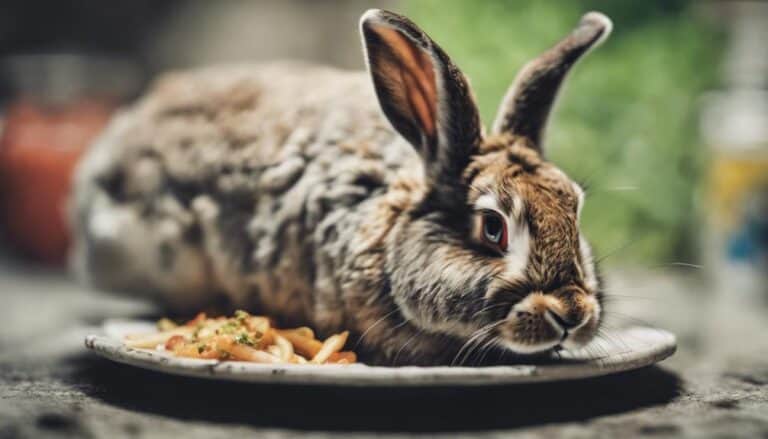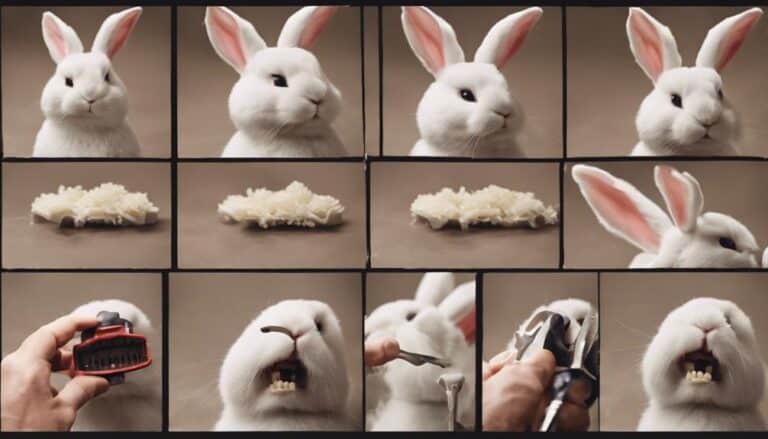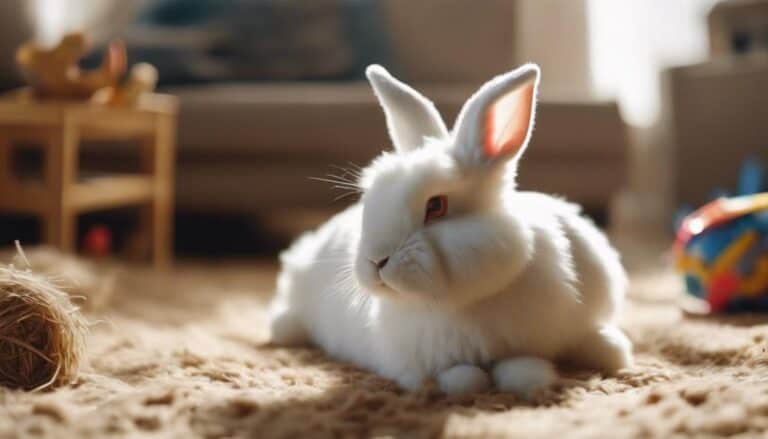If your bunny is biting, it's important to figure out why. It could be due to fear, stress, or a cry for attention. Spend time socializing with your bunny regularly to help build trust.
Keep them entertained with chew toys to prevent boredom. Make sure your space is bunny-proofed to create a safe environment. Provide safe chew toys for them to satisfy their natural instincts.
Use positive reinforcement when training them for good behavior. If needed, seek advice from a vet who knows about rabbits. Remember, getting to the root of the issue is key to stopping bunny biting effectively.
Contents
Key Takeaways
To avoid getting bitten, it's important to know how bunnies express themselves through body language. This can help you understand when they might be feeling scared or threatened. Regularly socializing your bunny can help them build trust with you and prevent them from becoming fearful or aggressive. It's also essential to provide them with stimulating toys and activities to keep them from getting bored.
Make sure to bunny-proof your living space to prevent any accidents or hazards, especially since bunnies like to chew on things. Redirect their chewing behavior by offering safe and appropriate items for them to gnaw on. If your bunny does end up biting, use positive reinforcement training methods to address this behavior. This can help them learn what is and isn't acceptable when interacting with you.
Understanding Bunny Biting Behavior
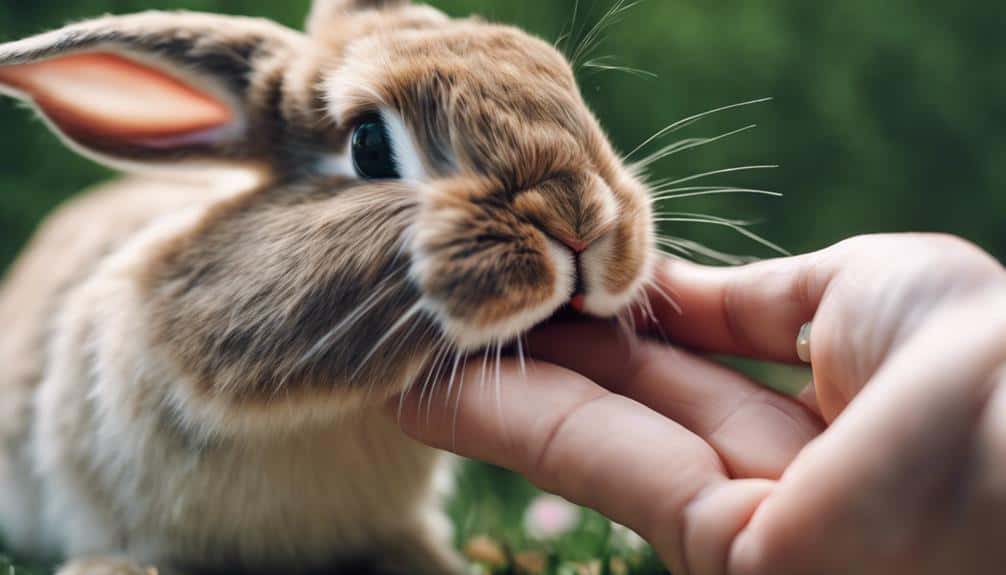
Have you ever wondered why bunnies bite? Well, understanding their behavior is the key to preventing such incidents. Rabbit bites usually happen when they feel scared, threatened, or protective of their space. Sometimes, if they're handled incorrectly, they might resort to biting. So, to avoid bunny bites, it's important to respect their boundaries and create a safe environment for them.
Biting can be a way for rabbits to express that they feel unsafe, insecure, or just want some attention. By paying attention to their body language and responding appropriately, you can prevent many biting situations. It's crucial to be patient and gentle when interacting with rabbits to build trust and avoid triggering their defensive instincts.
When it comes to little kids, it's a good idea to keep a close eye on their interactions with rabbits. Sometimes, young children may not know how to handle rabbits properly, which can result in bites. Teaching children how to approach and play with rabbits the right way can help lower the chances of biting incidents.
Socializing and Interacting Regularly
If you want to stop your bunny from biting, make sure you spend time socializing and interacting with them regularly.
By using gentle handling methods and positive reinforcement training, you can build trust and set boundaries.
The key is to create a positive atmosphere through bonding and interaction, which can help discourage biting behavior in your bunny.
Consistent Handling Techniques
When you spend time with your bunny and hang out with them often, it's important to be consistent. This helps your bunny feel safe and comfortable, which can prevent them from biting.
By sticking to a routine when you handle your bunny, you can teach them that being touched is okay and not something to fear. Socializing is key for bunnies to learn that human interaction is positive.
Regularly handling your bunny can help you both build a strong bond and reduce biting incidents. Just remember, being patient and consistent in how you handle your bunny will help you both feel more connected and trusting of each other.
Positive Reinforcement Training
Regularly spending time with your bunny and interacting with them can help build trust and decrease the chances of biting. Using positive reinforcement training is a great way to shape your bunny's behavior. By giving treats or praise when they behave well, you can encourage positive interactions. Watch your bunny's body language closely to understand how comfortable they are. Handling them gently and petting them can help them feel more relaxed and less likely to bite.
Creating a routine for playtime and bonding activities will strengthen the bond between you and your bunny, making biting less likely. Use simple phrases like 'good bunny' or 'gentle' to praise good behavior and discourage biting during your interactions.
Providing Enrichment and Stimulation
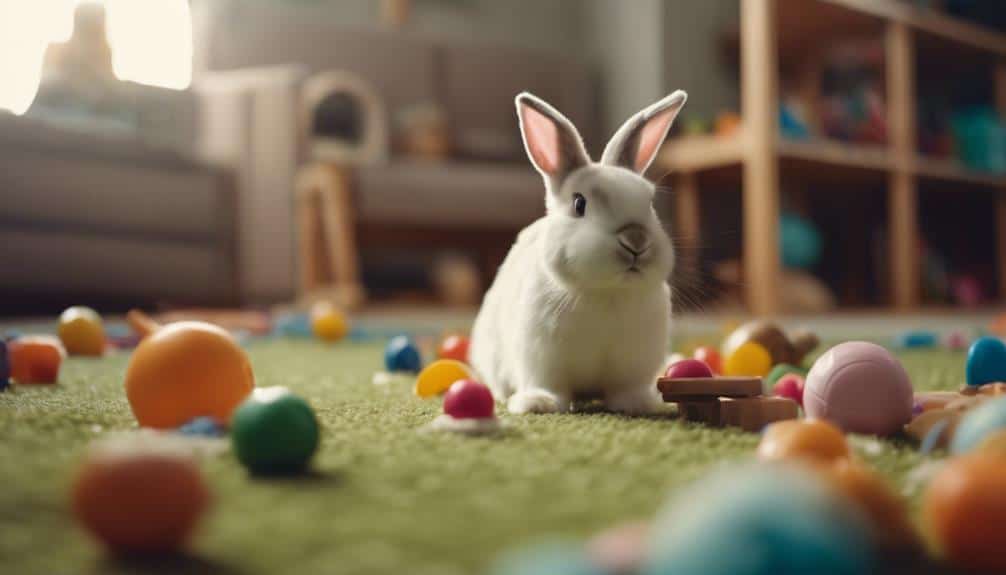
If you want to keep your bunnies mentally and physically engaged, try adding some fun activities like hiding food, giving them chew toys, and hanging treats for them to find. By providing a variety of safe chew items and cardboard boxes filled with treats, you can help prevent boredom-induced biting behaviors in your bunnies. Make sure to give them plenty of space to move around and explore by setting up a spacious living area with a run attached to their hutch.
Including stimulating elements like hanging chew toys and food can give your bunnies something to focus on, keeping them entertained and less likely to chew out of boredom. If your bunnies start chewing on their hutch, you can try using water misters or shaking a jar of coins as deterrents to discourage this behavior.
Creating a Safe Environment
To keep your bunny safe and prevent biting incidents, you'll want to bunny-proof your space. This means securing any hazardous items and electrical cords that could harm your furry friend. It's like baby-proofing a house, but for bunnies!
Make sure to provide your rabbit with safe chewing alternatives. Hay-based toys and wooden blocks are great options to redirect their biting behavior. You want to give them something safe and appropriate to chew on instead of your furniture or other items.
When it's playtime, be sure to supervise your bunny. This way, you can make sure they stay safe and out of harm's way. It's like keeping an eye on a curious toddler to make sure they don't get into anything they shouldn't. Your bunny will appreciate the extra attention and care!
Bunny-Proof Your Space
When you're setting up a safe space for your bunny, make sure to secure cords and get rid of any hazards like toxic plants. Here are four key steps to bunny-proofing your area effectively:
First, use barriers like baby gates or playpens to keep your bunny away from things that could harm them. This will help prevent accidents and keep them safe.
Bunny-proofing is crucial to stop your rabbit from destructive chewing and to ensure their well-being. By taking these precautions, you can create a safe environment for your furry friend.
Next, be sure to clear out small objects that your bunny could swallow or choke on. It's important to keep these out of reach to avoid any accidents.
Lastly, consider using materials for flooring and furniture that are safe and resistant to chewing. This will help prevent damage and keep your bunny from getting hurt.
Provide Chew Toys
Make sure your bunny stays safe and happy by giving them a variety of fun chew toys that match their natural instincts and promote good dental health. Chew toys are great for satisfying your bunny's need to chew and can help prevent them from gnawing on things around your home. By providing a mix of safe chew toys, you can keep your bunny entertained and lessen the chances of them chewing on stuff they shouldn't.
Try out interactive chew toys like treat-dispensing or puzzle toys to keep your bunny mentally engaged and redirect their biting behavior. Different textures such as wood, grass, or cardboard toys can cater to your bunny's preferences, keeping them busy and steering them away from inappropriate chewing. Remember, having a good assortment of chew toys is important for keeping your rabbit from nibbling on your stuff.
Supervise Playtime
Playing with your bunny can be a fun and rewarding experience, but it's important to prioritize safety. Here are some key tips to ensure a secure and enjoyable playtime for your furry friend:
First and foremost, always keep a close eye on your bunny during playtime. This will help you prevent any accidents and monitor their behavior effectively.
Make sure to create safe play areas by removing any potential hazards and ensuring that all spaces are bunny-proofed. This will prevent your bunny from getting into any trouble.
Regularly check the play areas for any dangers, such as wires or small objects that could harm your bunny. By staying vigilant, you can ensure a safe environment for playtime.
Provide your bunny with appropriate toys and activities to keep them engaged and redirect any biting behavior. This will make playtime more enjoyable for both you and your bunny.
Offering Appropriate Chew Toys
If you want your bunny to chew on the right things, give them a mix of safe chew toys made from materials like untreated wood, hay, or seagrass. These toys can satisfy your rabbit's natural chewing instincts and keep them from munching on stuff they shouldn't be. Remember to switch up the toys regularly to keep your bunny interested and prevent them from getting bored and turning to your household items for a snack.
Stay away from giving your bunny things like cords, plastic, or plants that could be harmful if chewed on. Keep an eye on their toys for any damage and swap them out when needed to make sure your bunny has a safe chewing experience. By providing the right chew toys, you can help your bunny keep their teeth healthy and stop them from wrecking your stuff.
Training With Positive Reinforcement
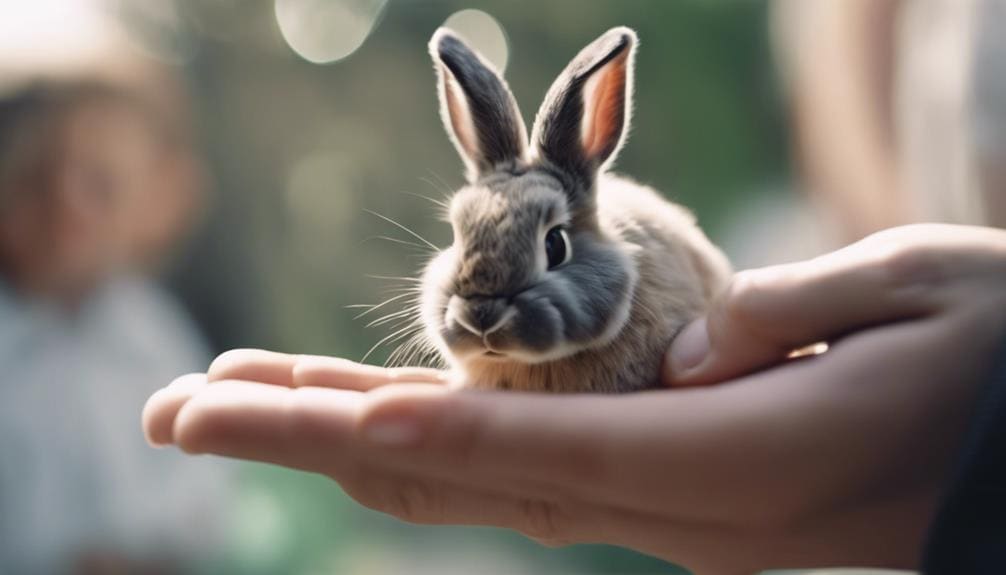
If your bunny behaves well and doesn't bite, make sure to reward them with treats or praise. This will help strengthen your bond and encourage positive habits.
Here are four important points to keep in mind when using positive reinforcement for training:
When your rabbit plays without biting, show them some love with their favorite treats or a gentle pat on the head. This will let them know they're doing a great job.
Consistency is key in reinforcing good behavior. Make sure to reward your bunny every time they don't bite to help them understand what behavior is expected.
Positive reinforcement training is a great way to build trust between you and your bunny. It creates a positive environment for learning and bonding.
Using positive reinforcement is a gentle and effective approach to addressing biting issues in bunnies without causing them stress or fear. It's a kind way to teach them what behavior is appropriate.
Seeking Professional Advice
If your bunny is giving you nibbles or bites, it's a good idea to chat with a vet who knows about rabbits. They can figure out why your bunny is biting, whether it's because they're scared, stressed, or dealing with hormonal stuff. A rabbit-savvy vet can suggest ways to change your bunny's behavior, train them differently, or even offer medical help to tackle the biting issue.
Getting advice from a pro can help you prevent your bunny from biting and make sure they're feeling good overall. With their guidance, you can come up with effective strategies to manage and stop the biting habit. This expert input is key for dealing with biting problems in rabbits and building a happy relationship between you and your furry friend.
Frequently Asked Questions
How Do I Stop My Bunny From Biting?
If your bunny is biting, you can try some training techniques to help stop this behavior. For example, you can use vocal cues and provide positive reinforcement when your bunny behaves well. It's also important to pay attention to your bunny's behavior cues and make sure they have a safe and secure environment to prevent biting incidents. If your bunny shows signs of aggression, it's a good idea to seek advice from a professional.
Why Does a Bunny Bite You?
Bunnies usually bite because they're scared, feel threatened, or want attention. If you understand why they're acting this way and use positive reinforcement, you can help reduce their aggression. It's important to create a safe and comfortable environment for your bunny to prevent biting incidents.
Do Rabbits Grow Out of Chewing?
Rabbits chew on things throughout their lives because they need to take care of their teeth. It's really important to give them chew toys and things to keep them busy. Even if you teach them not to chew on certain things, they might still do it sometimes. Their age and hormones can play a big role in how much they chew because of their teething process.
How Do I Stop My Rabbit From Attacking?
If you want to stop your rabbit from attacking, you can try using training techniques and behavior modification. When your rabbit behaves well, give them treats to reinforce the positive behavior. Make sure your rabbit has a safe and secure environment to minimize stress.
If your rabbit's aggressive tendencies persist, it's a good idea to seek advice from a professional. They can provide guidance on dealing with aggression in rabbits. Additionally, consider having your rabbit spayed or neutered as this can help reduce aggressive behavior.
Conclusion
So, to stop bunnies from biting, you need to understand why they do it, spend time socializing with them, give them things to keep them busy, make sure they're safe, offer toys for chewing, and use positive reinforcement when you're training them.
If you do all these things, you can help prevent your bunny from biting and have a great relationship with them. Remember, being patient and consistent is really important when you're dealing with biting problems.
If you need extra help, don't hesitate to seek advice from a professional.

